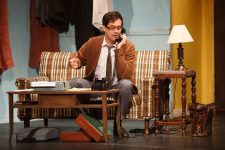CLARKSON’S COMIC CHOPS: Featured in Classic Theatre’s Second Summer Show

Perth has become a summertime home for Toronto’s Scott Clarkson, a performer now playing his sixth season at the Classic Theatre Festival with his starring role in the uproarious George Bernard Shaw comedy Arms and the Man, running until August 14 at 54 Beckwith Street East. “Working at the Festival has been some of the most challenging theatre I’ve done, and hugely rewarding,” Clarkson says. “Perth has always fed the part of me that loves a quieter pace, beautiful architecture and green spaces, and a bit of history too. And I’ve met so many wonderful people here: company members and volunteers, local merchants and theatregoers. I love this town.” Since 2011, Clarkson has reveled in roles “that have all satisfied something in me, a desire to communicate with the writers and actors and other theatre makers of the mid-20th century. It’s given me a chance to explore parts played by wonderful actors on stage and in film: Hume Cronyn, Henry Fonda, Charles Boyer, Bob Cummings, even Kevin Kline (in Arms and the Man).” Clarkson’s role as Captain Bluntschli in Arms and the Man is a homecoming of sorts, reminding the veteran actor of his study in New York’s HB Studio, where he first encountered Shaw’s work. Clarkson says he very much likes the character he inhabits for his six weeks in Perth. “I feel Shaw speaking his truth through him, and it’s remarkable what Shaw has these people say at the height of the Victorian era!” he says. “Arms and the Man allows Bluntschli to show us the truth of a military life behind the romantic facade. The Captain has served nearly fifteen years, and the cost of this becomes quickly apparent. Beyond the obvious exhaustion and fear that comes with losing a major battle and being on the run, he has of course seen and likely done many horrible things. No Charge of the Light Brigade bravura for him. If he has anything in common with a literary figure it’s the hero of Remarque’s All Quiet on the Western Front. Bluntschli figured out long ago that heroism can get you killed, and chocolate will keep you alive better than revolver cartridges. I see traces of him in the Marx Brothers’ Duck Soup, in Catch-22, in M*A*S*H.” Clarkson says audiences can expect a lot of comedy in Arms and the Man, as Shaw “wrote with wit and insight and dared to pose questions about how people lived their daily lives. He questioned everything. Why is it we marry? Why do we go to war? Why do we value the things we do, and at what cost? He doesn’t strike me as a 19th-century writer; he was pointing the way to the next century, laying the foundation for all the artists who wouldn’t accept a party line, from any government or church or military authority. I wish he was here today.” When Clarkson isn’t performing at the Classic Theatre Festival, he is involved in many other creative pursuits, from stage work in Toronto to… Continue reading





